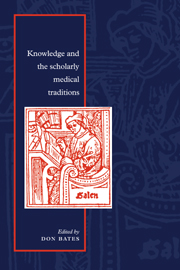Book contents
- Frontmatter
- Contents
- List of illustrations
- List of contributors
- Acknowledgements
- 1 Scholarly ways of knowing: an introduction
- Part 1 Scholarly medicine in the West
- Part 2 Chinese traditional medicine
- 9 Text and experience in classical Chinese medicine
- 10 Visual knowledge in classical Chinese medicine
- 11 A deathly disorder: understanding women's health in late imperial China
- 12 Re-writing traditional medicine in post-Maoist China
- Part 3 Āyurvedic medicine
- Part 4 Commentaries
- Index
12 - Re-writing traditional medicine in post-Maoist China
Published online by Cambridge University Press: 01 February 2010
- Frontmatter
- Contents
- List of illustrations
- List of contributors
- Acknowledgements
- 1 Scholarly ways of knowing: an introduction
- Part 1 Scholarly medicine in the West
- Part 2 Chinese traditional medicine
- 9 Text and experience in classical Chinese medicine
- 10 Visual knowledge in classical Chinese medicine
- 11 A deathly disorder: understanding women's health in late imperial China
- 12 Re-writing traditional medicine in post-Maoist China
- Part 3 Āyurvedic medicine
- Part 4 Commentaries
- Index
Summary
The field of ‘Traditional Chinese Medicine’ which caused such a stir in Western public health circles in the 1960s and ‘70s, and on which a few anthropologists and historians have commented since then, came into existence in its current institutional form only after the 1949 revolution that founded the People's Republic of China. In the 1950s, within the newly organized or expanded colleges, research institutes, publishing houses, and professional associations, a rationalized ‘traditional’ medicine came into being as a discrete ‘system of knowledge’. This essay emphasizes both the modernity and the historical continuities of systematic Chinese medical knowledge by examining a genre of autobiographical writing that emerged in the 1980s after the close of the Great Proletarian Cultural Revolution (1966–76). It sees writing medical knowledge and medical lives as a form of social labour that both modernizes and stubbornly resists full appropriation to either global bioscience or state development projects.
The practitioners and cadres who organized the profession of traditional Chinese medicine after Mao Zedong's 1955 proclamation that ‘our motherland's medicine is a great treasurehouse’ worked largely anonymously. Though they authored medical books and papers in technical journals, taught a great many students, and served on countless committees, their fame was largely propagated orally. It was politically inappropriate at the time to claim personal authority or draw attention to one's authorship. The masses were taken to be both the source and target of traditional medicine's genius.
At the close of the Great Proletarian Cultural Revolution, after the death of Mao and the fall of the Gang of Four in 1976, this professional culture of selfless service suddenly changed.
- Type
- Chapter
- Information
- Knowledge and the Scholarly Medical Traditions , pp. 251 - 276Publisher: Cambridge University PressPrint publication year: 1995
- 32
- Cited by



